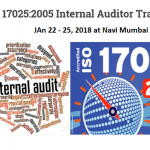12 Critical Success Factors that make an ISO implementation successful.

Any organization on the earth wants to become more efficient, effective, competitive and profitable. When an organization decides to implement any of the ISO standards like ISO 9001, ISO 14001, OHSAS 18001, ISO 22000, ISO 27001 etc., they sometimes feel that just by having some of the documentation compliances and audit that results in award of the ISO Certificate, they will be able to get the true benefits of the ISO Standards. They can certainly get the benefits provided the 12 points given below are taken care. The 12 critical success factors for effective ISO implementation are:
- Top Down approach – All effective ISO implementations are driven by top management with their critical involvement in the entire process.
- Sr. Management’s recognition of their crucial role in the ISO system management process.
- ISO involvement at all levels, jobs, and areas in the organization.
- Understanding of the organizational processes and the critical control points in the process.
- People trained in how to do their job, and interact effectively with the whole system.
- Focusing on organizational development & improvement, not just the bare minimum standard requirements of the standard.
- Finding balance between excess ISO bureaucracy, and insufficient ISO system depth to ensure consistent results.
- To make sure that ISO system is developed for the users and for the organization considering its ease of use and practicality.
- Dedication to following the agreed systems at all levels in the organization
- Keeping the organization focused on meeting the ISO implementation timeline
- Effective ISO internal auditing, focussed management review meetings and great importance to objectives / targets that are linked to performance appraisals or employee performance measurement system.
- Timely management response to ISO audit results.
If a consultant was relied upon to guide the ISO implementation, the fault for a poor ISO implementation may very well lie with the consultant. Was the consultant’s advise understood, and followed by Sr. Management? Most Sr. Management get distracted very early in the ISO implementation process, then abdicate (Sr. Management calls it “delegate”) the ISO implementation process to staff or consultants. The effective ISO implementation is often sacrificed for a quick ISO certificate on the wall with minimal effort and costs.
For quality consultants to be effective, they need to have a good understanding both of ISO 9001 and the sector or company they are seeking to apply it to. Effective ISO 9001 implementation is supposed to lead to improved productivity, efficiency, consistency and client service. If ISO 9001 is not delivering this, then it has not been effectively implemented.









